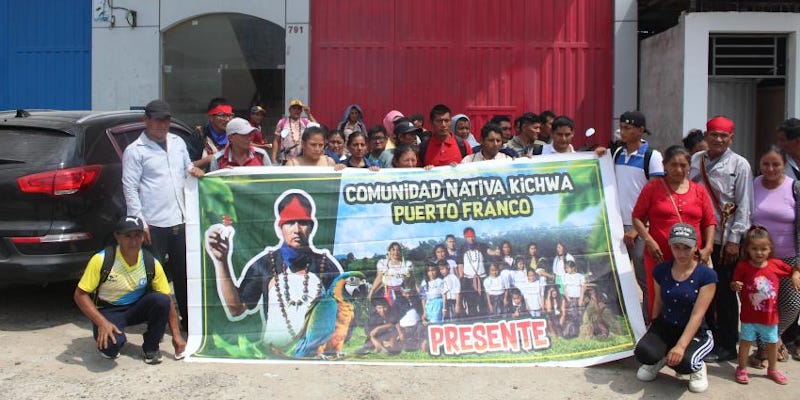Legal victory for the Kichwa community against exclusionary conservation and the Cordillera Azul REDD project in Peru
The Court ordered that the Kichwa should receive titling of ancestral territory, the right to free, prior and informed consent, and benefits from the sale of carbon credits since 2008.

In 2020, the Kichwa community of Puerto Franco and its federation, the Ethnic Council of the Kichwa Peoples of the Amazon (CEPKA) filed a lawsuit against the Peruvian Government and the Cordillera Azul National Park. The Kichwa community had been dispossessed of its territory by the Cordillera Azul National Park and forestry concessions.
The government declared the Cordillera Azul a national park in May 2001. It did so without the free, prior and informed consent of the people living there. The following year a company called CIMA (Centro de Conservación, Investigación y Manejo de Áreas Naturales) signed an agreement with the government to manage the national park.
In 2008, CIMA signed a 20-year contract to manage the Cordillera Azul National Park — this was the start of the Cordillera Azul REDD project. The decision to sell carbon credits from the project was made without the free, prior and informed consent of the communities living there.
Since then, more than 30 million carbon credits have been sold from the project. But the Kichwa have not seen any benefits from the sale of carbon credits.
In April 2023, the Kichwa community won an important legal victory when the Mixed Court of Bellavista in the San Martín region ruled that the local authorities should start a titling process of the territory traditionally used and occupied by the Kichwa community.
Then, just ten days later, an appeals court set the ruling aside, on a technicality.
Lawsuit is “well-founded”
On 13 December 2024, the Mixed Court of Bellavista declared the lawsuit to be well-founded. Forest Peoples Programme reports that,
[T]he court has ruled in favour of the Kichwa people, ordering the titling of the territory of the Puerto Franco Kichwa Native Community, the nullity of forest concessions, the holding of a prior consultation on the creation of the PNCAZ and its Master Plan, and guaranteeing the community’s access to natural resources and its participation in the management of the park, including the distribution of benefits from the sales of carbon credits that have taken place behind their backs since 2008.
The lawsuit was filled against the Ministry of the Environment (MINAM), the Ministry of Agrarian Development and Irrigation (MIDAGRI), the Regional Agrarian Directorate of the Regional Government of San Martin (GORESAM), two forestry concessions (Agrupación Maderera Alto Biavo S.A.C. and that of the owner Eisen Paredes), the National Forestry and Wildlife Service (SERFOR), the National Service of Natural Areas Protected by the State (SERNANP), and the Head of the Cordillera Azul National Park (PNCAZ). In addition, CIMA was incorporated for its role in the management of the Cordillera Azul National Park.
Forest Peoples Programme explains that in its December 2024 ruling, the Court ordered the defendants to do the following:
That the Regional Agrarian Directorate of GORESAM initiate the process of titling the integrity of the territory traditionally used and occupied by the community in property. In addition to the non-application of articles 11 and 18 of Law 22175 and 76 of Law 29763, related to cesión en uso leasehold contracts.
That SERFOR resize the Permanent Production Forests (BPP) that affect the claimed territory.
That the Regional Environmental Authority of GORESAM declare the forestry concessions that affect the Kichwa territory null and void.
That SERNANP, 1) carry out a free and informed consultation on D.S. 031-2001-AG that creates the PNCAZ and its Master Plan 2017-2021; 2) instruct the park rangers of the Park not to impede access to the natural resources of Puerto Franco and other affected Kichwa communities; 3) comply with the right of the native communities over which the PNCAZ overlaps to benefit from conservation activities in their territories, such as the Park's REDD+ project; 4) comply with the right of the native communities over which the PNCAZ overlaps to participate in the management of the PNCAZ with decision-making capacity.
In a statement, Henry Fasabi, apu of Puerto Franco, said,
“I am very happy and satisfied. Not everyone gets into a struggle like this against the state, the so-called SERNANP, CIMA and the concession. This is for the brave. Puerto Franco has been in that position, facing a lawsuit against the State. It is a joy for me to have won this case. We are excited, despite the fact that they have discriminated against us, saying that we are not Indigenous, on 12 November we demonstrated that we do speak our Kichwa language.”





Aleluya!!, this is a long standing historical victory against discrimination, dispossession, and new forms of colonialism. Hope that this legal win will be applied asap.
Bravo! This counts as a Win! But I am amazed at the number of govt agencies involved, all collecting salaries!